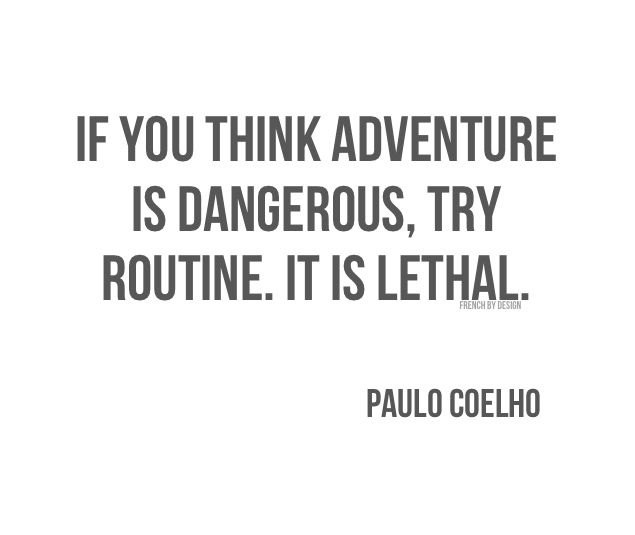Word-Of-the-Week #934: Routine
June 30, 2022 by Susan Clarke
Routine – what you do every day that is habitual, unvarying, and unimaginative.
How much of your day feels habitual, unvarying, and unimaginative? How would it feel to instead have everyday filled with interesting and enjoyable experiences?
This week features the 5 Benefits of an Inquiring Mind from “The Power of Curiosity. Discover how cultivating an inquiring mind can help you lead a happier, healthier life,” by Todd Kashdan. His follow up excerpts, “Curiosity is something that can be nurtured and developed. With practice, we can harness the power of curiosity to transform everyday tasks into interesting and enjoyable experiences. We can also use curiosity to intentionally create wonder, intrigue and play out of almost any situation or interaction we encounter. It all starts with wanting to know more.
5 Benefits of an Inquiring Mind
Curiosity, at its core, is all about noticing and being drawn to things we find interesting. It’s about recognizing and seizing the pleasures that novel experiences offer us, and finding novelty and meaning even in experiences that are familiar.
When we are curious, we see things differently; we use our powers of observation more fully. We sense what is happening in the present moment, taking note of what is, regardless of what it looked like before or what we might have expected it to be.
We feel alive and engaged, more capable of embracing opportunities, making connections, and experiencing moments of insight and meaning — all of which provide the foundation for a rich, aware and satisfying life experience.
5 of the important ways that curiosity enhances our well-being and the quality of our lives:
- Health – In a 1996 study published in Psychology and Aging, more than 1,000 older adults aged 60 to 86 were carefully observed over a five-year period, and researchers found that those who were rated as being more curious at the beginning of the study were more likely to be alive at its conclusion, even after taking into account age, whether they smoked, the presence of cancer or cardiovascular disease, and so on.
- Intelligence – Studies have shown that curiosity positively correlates with intelligence. In one study published in the Journal of Personality and Social Psychology in 2002, researchers correctly predicted that high novelty-seeking (or highly curious) toddlers would have higher IQs as older children than toddlers with lower levels of curiosity. Researchers measured the degree of novelty-seeking behavior in 1,795 3-year-olds and then measured their cognitive ability at age 11. As predicted, the 11-year-olds who had been highly curious 3-year-olds later scored 12 points higher on total IQ compared with low stimulation seekers. They also had superior scholastic and reading ability.
Other studies have shown that high levels of curiosity in adults are connected to greater analytic ability, problem-solving skills and overall intelligence. All of which suggests that cultivating more curiosity in your daily life is likely to make you smarter.
- Social Relationships – It is far easier to form and maintain satisfying, significant relationships when you demonstrate an attitude of openness and genuine interest. One of the top reasons why couples seek counseling or therapy is because they’ve become bored with each other. This often sparks resentment, hostility, communication breakdowns and a lack of interest in spending time together (only adding to the initial problem). Curious people report more satisfying relationships and marriages. Happy couples describe their partners as interested and responsive.
- Happiness – In one of the largest undertakings in the field of psychology, two pioneers in the field of positive psychology, Martin Seligman, PhD, and Chris Peterson, PhD, devised a scientific classification of the basic human strengths. This system was the end result of reading the works of ancient philosophers, religious texts and contemporary literature, then identifying patterns, and finally subjecting these ideas to rigorous scientific tests. Their research eventually recognized 24 basic strengths. And, of those 24 strengths that human beings can possess, curiosity was one of the five most highly associated with overall life fulfillment and happiness.
There are other important relationships between curiosity and happiness. In his book Stumbling on Happiness (Knopf, 2006), Harvard University psychology professor Daniel Gilbert, PhD, shows that, while we think we know what will make us happy in the future, we are actually less likely to find joy as a result of a planned pursuit than by simply stumbling upon it. It follows that by cultivating curiosity and remaining open to new experiences, we increase our likelihood of encountering those surprising and satisfying activities.
- Meaning – If we are going to find a meaningful purpose or calling in life, chances are good we will find it in something that unleashes our natural curiosity and fascination. Indeed, curiosity is the entry point to many of life’s greatest sources of meaning and satisfaction: our interests, hobbies and passions.
While being passionate about something naturally renders you curious to know as much as you can about it, it also works the other way around: The more curiosity you can muster for something, the more likely you are to notice and learn about it, and thus the more interesting and meaningful it will become for you over time. The greater the range and depth of our curiosity, the more opportunities we have to experience things that inspire and excite us, from minute details to momentous occasions.”
This week is all about creating a routine of curiosity. Would you like to be smarter? How about having better health as you age? How willing are you to being more open to new experiences?
Stay Tuned! Next week 4 strategies to help you “Tune in to Your Curiosity.”
I LOVE feedback! Join my Facebook community on my FUN-damentals Fan Page.


